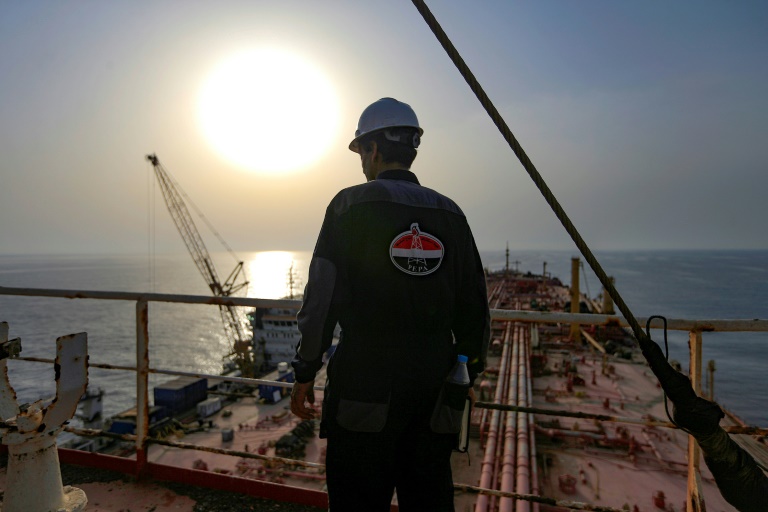Leaks, repairs, stress: how skeleton crew stopped Red Sea oil disaster

A skeleton crew has worked for years to stop the FSO Safer leaking oil or exploding
ABOARD FSO SAFER – When an alarm sounded on the decaying oil tanker off Yemen’s coast, signalling a leak in its engine room, Hussein Nasser quickly sprang into action.
Working around the clock for days, he and the half-dozen other people on board the FSO Safer fashioned makeshift iron strips to patch a burst pipe, before divers arrived to install a permanent steel plate to keep seawater from sinking the ship.
The incident in 2020 was just one example of how a motley crew of sailors and engineers –- numbering no more than seven or eight at any given time –- have laboured for years to keep afloat the FSO Safer tanker abandoned off Yemen, and stave off an environmental calamity.
The sinking of the vessel, or an on-board explosion, would have unleashed a thin slick of oil across the Red Sea, imperilling wildlife, coastal fishing villages, lifeline ports and maritime traffic.
The United Nations hopes anxiety about the 47-year-old Safer –- which has been woefully neglected during Yemen’s ongoing war — is about to ease. That depends on the successful transfer of its oil to a replacement ship, the Nautica, that arrived off the country’s coast on Sunday.
It represents a rare bright spot after more than eight years of fighting between the Huthi rebels, who control the capital Sanaa and waters where the Safer is moored, and the internationally recognised government based in the southern city of Aden.
For members of the Safer’s skeleton crew, the milestone is a time to reflect on their long stints at sea with little food, no air conditioning and near-constant stress.
“Anxiety accompanies us all the time as a result of the worn-down condition of the ship,” Nasser, an engineer with short greying hair and a dark moustache, told AFP.
Like other crew members interviewed, he works for the Huthis’ maritime affairs authority.
“The Safer is like a front line and we have had to fight on it –- no different from a military front line,” Nasser said.
– ‘Unsung heroes’ –
The Iran-backed Huthis praise men like Nasser as the “unsung heroes” of the Safer saga.
The villains, in their telling, are members and backers of the Saudi-led military coalition fighting in support of the Aden-based government, which they blame for a blockade of the Hodeida port that starved the Safer of needed equipment.
Yet the Huthis themselves were long accused of courting disaster by using the Safer as a bargaining chip, blocking UN inspection requests and demanding that oil revenue be used to pay the salaries of their employees.
After more than eight years without maintenance, there is no disputing the ship is in awful condition, with rust and fast-spreading fungus streaking its red-and-grey hull, whose thickness has worn away by four millimetres in places.
“Any oil ship needs regular maintenance… to keep the ship safe,” said Ebrahim al-Moshki, head of Hodeida’s maritime affairs authority.
“But the staff here are sometimes just three or five, while they used to be 72” before the war.
The situation would be far worse if not for the skeleton crew, said Edrees al-Shami, the Huthi-appointed executive general manager of SEPOC, the Yemeni oil and gas company.
“They worked in very risky and dangerous conditions and they were successful in patching it up. And they were not recognised. It was not publicised,” Shami said.
– ‘Swimming in the oil’ –
Fixing leaks below deck was especially fraught given the intense heat and vapours coming off the crude, which can raise the possibility of igniting a blast from something as small as the flick of a cigarette.
“Our major problem is the possibility of ignition,” Shami said.
“They worked through all these flammable gases, worked inside the oil, almost swimming in the oil, so it was very tough.”
On Sunday, around the time the Nautica was arriving off the port city of Hodeida, Nasser, the engineer, visited the city’s main fish market which would almost certainly have been shut down in the event of an oil spill.
The UN has said half a million people work in the area’s fishing industry, and that 200,000 livelihoods “would be instantly wiped out”.
“All of them would be have been affected badly,” said Nasser, gesturing to the fishermen trying to unload wheelbarrows full of barracuda, parrotfish and even sharks at auction.
Asked what his plans were after the Safer is fully decommissioned, Nasser, in his late fifties, said he would accept whatever new mission maritime authorities decide to give him.
But after years of living on a vessel in danger of sinking or going up in flames, he said he wanted to take time to “catch some minutes of sleep and have a rest”.
